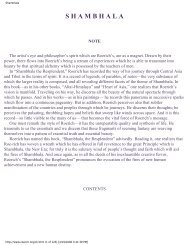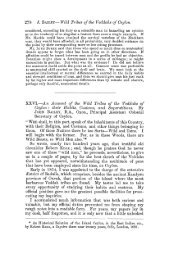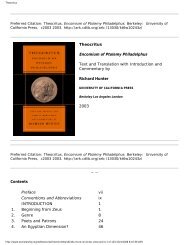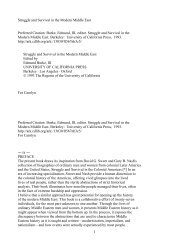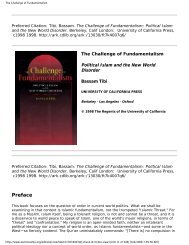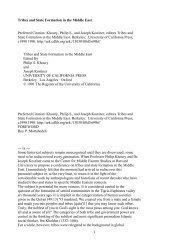Between Two Worlds Kafadar.pdf
Between Two Worlds Kafadar.pdf
Between Two Worlds Kafadar.pdf
Create successful ePaper yourself
Turn your PDF publications into a flip-book with our unique Google optimized e-Paper software.
of Political turbulences. The early thirteenth-century acquisition of the port<br />
towns of Sinop (by the Black Sea) and Alanya (by the Mediterranean) brought the<br />
Seljuk system and the Turco-Muslim-dominated economies of Anatolia that it<br />
controlled at the time into direct touch with the Levantine sea trade. By the<br />
end of that century, more than one hundred caravanserais in the peninsula<br />
provided lodging and protection to merchants (and other travellers).[7]<br />
It is revealing, for instance, that what is no more than a remote backwater in<br />
modern Turkey, an obscure plateau between Kayseri and Maras , once entertained a<br />
lively international fair where Middle Eastern, Asian, and European merchants<br />
exchanged commodities like silk textiles, furs, and horses. True, the fair does<br />
not seem to have survived long into the era of Mongol Ilkhanid direct rule, but<br />
trade is not known to have suffered in general. The chiefdoms that emerged in<br />
western Anatolia, where even Mongol power could hardly reach, to some extent<br />
built their power on raids and pillaging, but the western Anatolian coastline<br />
was integrated into a brisk Levantine trade around 1300, and the chiefs were<br />
signing commercial treaties with the likes of Venice in the early fourteenth<br />
century.[8] In fact, fragmentation and the emergence of small local powers may<br />
well have increased the possibility for a more local redistri-<br />
― 7 ―<br />
bution of resources that would otherwise have been siphoned off to distant<br />
imperial capitals.<br />
One of those small chieftains, situated in the northwest in what was still<br />
partly Byzantine Bithynia, belonged to the clan of a certain Osman. He belonged<br />
to an exceptional generation (or two) of creative minds and social organizers<br />
who, either personally through their deeds or through their legacy as it was<br />
constructed and acted upon by followers, became the pivotal figures, the<br />
magnets, around whom the vibrant yet chaotic social and cultural energies of the<br />
Turco-Muslims of medieval Asia Minor ultimately found more-regular paths to<br />
flow. Since then, these figures, as embodied in the rich lore that has been<br />
built around them (whatever the relationship of such lore to their "real" or<br />
"historical" life), have represented the "classics" of western, or one might<br />
also say Roman, Turkish culture. Mevlana Celaleddin Rumi and Haci Bektas Veli ,<br />
for example, are the spiritual sources, respectively, of the two largest and<br />
most influential dervish orders in Ottoman lands. But their influence reaches<br />
far beyond any particular set of institutional arrangements, however large these<br />
may have been, and cuts across orders, social classes, and formal institutions.<br />
They have rather been fountainheads of broad cultural currents and sensibilities<br />
over the centuries. Yunus Emre's appeal has been even more ecumenical, with his<br />
poetry considered by successive generations to be the most moving and<br />
unadulterated expression of piety in Anatolian Turkish; dozens of imitators<br />
tried to pass their own works off as those of Yunus , and dozens of villages<br />
claimed to have his shrine. A certain Nasreddin of thirteenth-century Anatolia<br />
seems to have been at least the excuse for the creation of the lore of Nasreddin<br />
Hoca, the central figure of a corpus of proverbial jokes that now circulate,<br />
with many later embellishments of course, from the Balkans to central Asia. Ahi<br />
Evren may be the least well known of these figures in the modern era, but his<br />
13




